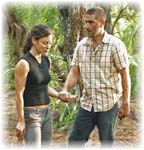English & TV - Aprender inglés con series de TV
Learn with LOST
En esta parte, analizamos extractos de guiones de series de televisión para entender el uso del inglés cotidiano auténtico. Lee los fragmentos e intenta comprenderlos. Luego, lee la explicación del vocabulario. Finalmente, vuelve a leer el texto.
Recomendaciones para aprender inglés
con series de TV
1. Observa una escena corta, retrocede y vuelve a mirarla para tratar de entenderla.
2. Si es posible, desactiva los subtítulos en español. Si no logras entender el diálogo, activa la opción "CC" (Closed Caption) en tu televisor para ver los subtítulos en inglés.
3. Intenta mirar capítulos de series que hayas visto. Dado que ya conoces la trama, podrás concentrarte más en el vocabulario y las expresiones usadas en las conversaciones.
4. Repite las frases que escuchas y si no entiendes algo, utiliza un diccionario.
5. Presta atención a la pronunciación y la entonación. De esta forma, entrenarás el oído para identificar las palabras y los diversos acentos, lo cual te ayudará a mejorar tu comprensión del inglés.
From the episode 'Walkabout'
 JACK: What's going on?
JACK: What's going on?HURLEY: Jethro here's hoarding the last of the peanuts.
SAWYER: My own stash. I found it in there.
JACK: What about the rest of the food?
HURLEY: There is no rest of the food, dude. We kind of ate it all.
SHANNON: What?
JACK: Okay, everybody, just calm down.
SAYID: We can find food. There are plenty of things on this island we can use for sustenance.
SAWYER: And exactly how are we gonna find this sustenance?
LOCKE: We hunt.
| what's going on? | Expresión frecuente que significa ¿qué sucede? |
| to hoard | acaparar. A hoard es una reserva secreta de provisiones. |
| stash | alijo, provisiones |
| dude | (slang, informal) amigo, tipo |
| kind of | en cierto modo |
| on this island | en esta isla. Notar el uso de la preposición on. |
| sustenance | sustento, mantenimiento |
| gonna | Forma coloquial de going to (ir a) |

KATE: Who says this is my first time boar hunting?
JACK: Uh-huh. Tell me something. How come anytime there's a hike into the Heart of Darkness, you sign up? You know what's in there.
KATE: Actually, I don't... and neither do you.
JACK: What's your feel on our new friend?
KATE: He seems to know what he's doing.
JACK: Call me paranoid, but anyone who packs a suitcase full of knives...
KATE: If I didn't know any better, I'd say you're worried about me, Jack.
JACK: If I didn't know any better, I'd say you have a problem staying in one place for very long, Kate. So, you wanna tell me why you're really going?
KATE: Sayid gave me this so he can triangulate the distress signal we heard, and find the source.
JACK: This isn't about boars?
KATE: I'm a vegetarian.
| boar | jabalí |
| huh? | Interjección usada al final de una pregunta, para pedir aprobación o acuerdo. Equivale al español eh?: Así que... cazando jabalí ahora, eh? |
| un-huh | Interjección usada para decir sí o cuando se desea que la otra persona continúe hablando. Equivale al español ajá. |
| how come | Forma familiar que significa ¿cómo es que? |
| hike | caminata, excursión |
| to sign up | inscribirse |
| neither do you | ni tú tampoco |
| wanna | Forma coloquial de want to (querer) |
LOCKE: The ground here has been routed up. That's how boars get the majority of their food. They dig. Afterwards, they generally wallow in the dirt and rub up against the trees, scoring it with their tusks.
MICHAEL: Okay. So what's all that mean?
LOCKE: It means we're close.
| to route up | marcar un camino |
| to dig | cavar, escarbar |
| to wallow | revolcarse |
| to rub up against something | frotar, rozar contra algo |
| to score | En este caso, significa rayar. |
| tusk | colmillo |
| close | En este caso, significa cerca. |
The scripts and the images are copyright.
They are used here for educational purposes only.
Otras páginas que pueden interesarte
Descubre el origen de las palabras en
The Story behind the Words
Ingresa en English & Songs.
 Practica inglés con ejercicios de comprensión de lectura basados en artículos de cultura inglesa y noticias en Reading
Practica inglés con ejercicios de comprensión de lectura basados en artículos de cultura inglesa y noticias en Reading
 Practica comprensión auditiva (listening comprehension) con noticias de la actualidad.
Listening
Practica comprensión auditiva (listening comprehension) con noticias de la actualidad.
Listening



